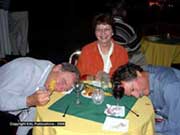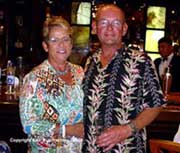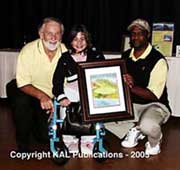
February 2006 Issue Highlights
For more complete coverage, send us an e-mail to
request a back issue.

For more complete coverage, send us an e-mail to
request a back issue.

NACS/PEI Conventions and Joint Trade Show

Pacific Oil Conference Reconvened Board Meeting

Southern California Petroleum Industry Golf and Tennis Tournament
Want to see the photos that didn't make the issue? Check out the Cutting Room Floor.
Hawaii Diesel Prices Top $3.40 Per Gallon
BP Owns 100% of Olympic Pipeline
Humboldt Petroleum Acquired by Peninsula
Beall Acquires Marquez Manufacturing
High Prices Follow Hawaii Price Cap
HONOLULU, HI. — Diesel prices in Hawaii hit $3.49 per gallon at the end of the year, a record high for the island state.
The diesel prices were on the rise as gasoline prices were falling and averaging 30% high than the year before, according to the American Automobile Association.
Local businesses — notably tour bus operators, construction companies, and boat captains — who rely on diesel say the record prices are hurting their profits.
"My fuel bill went up by about $1,500," said Sonny Rivera, owner of Aikane Sport Fishing, talking with local reporters. "It got to the point where I wasn't even looking at the prices."
High diesel prices on Hawaii are being attributed to reduced supply from two major the island's two major fuel sources. Lower diesel production through the Fall on the Mainland and higher international demand has meant there is less fuel available to import into Hawaii.
Diesel prices are not regulated as part of Hawaii's gasoline price cap law. The regulation only limits the wholesale price of gasoline on the island.
The high prices have been a boon to one industry firm: Pacific Biodiesel. The Maui-based firm, which utilizes used restaurant oil to make the alternative fuel, is marketing the biodiesel for $2.84 per gallon on Maui and $2.91 per gallon on Oahu.
Pacific Biodiesel says the demand for its lower-priced diesel product far exceeds its capacity. The company has been forced to create a customer waiting list for those hoping to buy the fuel.
RENTON, WA. — BP, who has been operator and the majority stockholder in the Olympic Pipe Line, has purchased the balance of shares in the pipeline from Shell Pipeline Company LP to become the 100% owner.
"The day-to-day operations of the Olympic pipeline will continue unchanged," said Chris Maudlin, Olympic's President. "BP will continue to operate the pipeline, and safety remains our top priority."
The Olympic Pipeline supplies up to 325 thousand barrels of fuel per day for the citizens of Seattle and other metropolitan areas up and down the I-5 corridor. It is the major supplier of jet fuel to Sea-Tac International Airport and Portland International Airport.
EUREKA, CA. — Humboldt Petroleum has been acquired by Peninsula Petroleum of Redwood City, CA., effective as of mid-December.
Founded in 1972, Humboldt operates a wholesale facility as well as 16 gasoline stations and convenience stores in Northern California marketing under the Shell, Valero, and Gas 4 Less brands.
Peninsula officials say that Humboldt owners Bob Wotherspoon and Jim Seiler retired from the company when the acquisition was completed but the remainder of the Humboldt employees will be offered positions with the new company. The former Humboldt offices will be maintained in Eureka.
Peninsula Petroleum is owned by M.J. Castelo and renowned race car drivers Mario Andretti and Michael Andretti.
"We are pleased with the union of these two very outstanding and credible organizations," said Bob Wotherspoon, announcing the sale. "This combination ensures continuity in the organization and continued service excellence and quality products for our loyal customers."
PORTLAND, OR. — Beall Corporation, based here, has acquired Marquez Manufacturing of Sunnyside, WA. to help the company "meet the high demand for its aluminum tank and dump trailers." The purchase price was not disclosed.
The deal includes the Marquez 40,000 square foot manufacturing plant which Beall officials say will produce approximately 200 trailers a year. The company estimates the new plant will add $10 million in sales to the company's annual revenue.
HONOLULU, HI. — The highest street prices on record for Hawaii were recorded following the enactment of Hawaii's gasoline cap law.
Under the terms of the law, the maximum Honolulu wholesale price for gasoline is set each Wednesday based on average wholesale prices in Los Angeles, the Gulf Coast, and New York. Taxes of approximately 62 cents are added to the cap price as well as a dealer mark-up, which is averaging around 15 cents per gallon.
The gasoline price cap law became effective on September 1. By September 18, Honolulu was posting its highest recorded average street price of $3.594 per gallon for regular unleaded gasoline. Hilo, Hawaii's average price for the fuel was $3.773 per gallon and Wailuku, Maui's average was $3.927 per gallon. Overall the statewide average for regular unleaded gasoline was $2.684 per gallon.
Street prices fell below $3.00 per gallon by the end of October, reflecting the drop in wholesale prices on the Mainland. Chevron dealer Barney Robinson told local reporters that he had to "bust out my old number two" to change the prices on his signage. "It's been collecting cobwebs on the shelf the last six weeks."
When the prices first fell below $3.00 per gallon, service station owners discovered another problem: they ran out of fuel. Many drivers had been waiting for gasoline prices to drop and were running their cars "on fumes." The sudden spike in demand caused service station dealers to run their tanks dry of fuel.
Dealer Robinson said that his employees were often called upon to help customers push their cars into their Chevron station because their tanks had run dry. He reported that one driver had pushed his car down the major thoroughfare Nimitz Highway to get to the station.
"How dangerous is that?" asked Robinson. "He's going to get hit by a car. He's going to slip and fall." He added, "Look at what everybody's going through. We're all trying to feel our way through this crazy law."
The Lex Brodie station in Kakaako reported that by lowering its price by a few cents it ran out of regular unleaded by mid-afternoon. Station manager Bill Gray said the station was running out of fuel because "people who came in had less gas" and were, therefore, buying more.
High prices continued throughout the Fall, although they were generally below the $3.00 per gallon mark. The American Automobile Association reported that Hawaiian motorists were paying 14.4% more for their fuel than they had a year earlier.
One resident of Kailua, Mary Lerps, told the Honolulu Advertiser that she couldn't believe the low fuel prices when she visited Coeur d'Alene, Idaho where a gallon of gasoline was almost 80 cents per gallon lower. "I even took a picture" of the price sign, she stated. "The people at the gas station thought I was crazy."
Bill Green, the former owner of Kahala Shell and now working as a consultant to the station, told local reporters that "everything is happening because of that idiotic [price cap] law. It's a shame we have to put up with this because a bunch of [lawmakers] thought they know more than the people that are in business."
Originally published in the February 2006 issue of O&A Marketing News.
Copyright 2006 by KAL Publications Inc.
Serving the 13 Western States, the World's Largest Gasoline, Oil, Fuel, TBA and Automotive Service Market